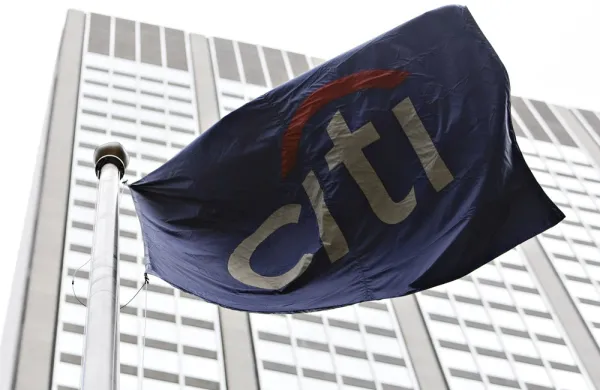
Illustration by II
The story of Citibank’s mistaken $900 million loan repayment starts with shaving cream.
More accurately, the intellectual property behind shaving cream owned by a Revlon subsidiary — along with many of Revlon’s other products.
Back in 2016, personal care brand Revlon acquired Elizabeth Arden, a fellow makeup label and the one-time seller of Britney Spears’ fragrance line.
Revlon paid cash for Elizabeth Arden, $870 million in total. After the deal closed in September 2016, Revlon took out two loans: a $1.8 billion senior secured term loan facility, and a $400 million senior secured asset-based revolving credit facility.
The purchase took place at a pivotal time in the beauty industry. Direct-to-consumer startup Glossier was taking off, and its dewy, millennial pink branding and influencer-savvy marketing was changing the beauty business, leaving Revlon behind.
“Revlon’s traditional reliance on established fashion icons as ambassadors for its brands was failing to generate the same buzz as fashion upstarts and self-made experts who were savvy with social media platforms,” according to a lawsuit filed by UMB Bank against Revlon and Citi on August 12.
Roughly four years later, a dispute over the loans that Revlon used to fund its acquisition has spiraled into four lawsuits involving at least sixteen companies and $900 million.
To understand the loan debacle, one must first understand its root: the acquisition itself.
Revlon acquired Elizabeth Arden, which was publicly traded at the time, for $14 per share in cash, a 50 percent premium over the company’s closing price on June 16, when the deal was announced. The deal included a provision for the repayment of Elizabeth Arden’s debt and preferred stock.
BofA Securities and Citi agreed to commit a total of $2.6 billion in financing for the deal, which would be used to refinance the debt of both Elizabeth Arden and Revlon. The lenders on the deal included Brigade Capital Management, Highland Capital Management, and Symphony Asset Management, among 37 others, according to one lawyer’s estimates.
The loans were secured using intellectual property as collateral, including beauty brand trademarks. The value of this collateral “was enormous relative to the value of the entire Revlon enterprise,” according to UMB’s lawsuit.
“The lenders… premised their investments on the quality of, and their access to, this collateral,” the suit stated.
The problems started in August 2019, when Revlon executed a plan to take out a second loan worth $200 million. Private equity firm Ares Management provided the money, and in exchange, Revlon provided collateral: the intellectual property of American Crew, a men’s shaving and grooming brand ubiquitous at drugstores.
That intellectual property, however, had already been pledged as collateral for one of the loans that Revlon took out in 2016 to fund its acquisition of Elizabeth Arden, according to a lawsuit filed by UMB Bank this month.
According to the UMB lawsuit, Revlon was “just getting started.” In the spring of 2020, Revlon closed a deal that, according to the UMB suit, transferred the intellectual property rights of many more of its brands to its subsidiaries, including the rights for Elizabeth Arden, Almay, Curve, and others. Revlon then allegedly issued new loans with priority liens on that intellectual property, displacing the 2016 lenders.
But to complete the deal, Revlon needed consent from those lenders — lenders who, according to UMB, were by then familiar with Revlon’s “pillaging techniques having been burnt once with respect to the American Crew” intellectual property.
These lenders assembled in an effort to push back on the deal’s execution. A dispute erupted; in June, the lenders tried to replace Citi as the loan’s facilitator with UMB Bank.
All summer, amid a pandemic and volatile stock markets, the conflict continued to stew. On a hot, stormy August day at the United States District Court’s southern New York branch, the situation reached a boil.
On August 12, UMB Bank filed its lawsuit in that court on behalf of the lenders against Citi, Revlon, and others, claiming that the personal care company had used intellectual property that served as collateral for Revlon’s 2016 loan to back a second loan, which Revlon took out in 2019.
The 117-page complaint levies a litany of reasons why the judge assigned to the case, Lorna Schofield, should rule in the lenders’ favor. To hear UMB tell it, Revlon “stole” the 2016 lenders’ intellectual property and behaved in a way that was “disloyal” and “nefarious.”
"We are entirely confident in our position as agent and in the complaint as filed,” a spokesperson for UMB said via email.
The next day, the Wall Street Journal broke the news that two days prior, Citigroup had accidentally repaid Revlon’s lenders nearly $900 million — the full principal and interest that the cosmetics company owed. As the Journal reported, Citi had asked the lenders to return the money. At least some of those lenders did not comply.
“The lender group had declared an event where they wanted to be repaid and Citi repaid them,” a source familiar with the matter told II. The source added that it was unclear to them why the lenders would return the money they were owed.
On August 17, the first indication came that Citi wouldn’t accept the lack of repayment. That day, the bank filed the first of three lawsuits, alleging that Brigade Capital Management “unlawfully attempted to capitalize on the mistaken overpayment” by keeping the $175 million that Citi paid days earlier.
According to Citi’s suit, the bank had intended to pass Revlon’s interest payment through to Brigade, but instead paid more than 100 times the amount that its calculation statement showed as the total due. Citi claimed that there was “crystal-clear evidence that the payments were made in error.” But in a letter to the court filed soon after, Brigade’s attorney argued that it was “not believable” that Citi could have mistakenly repaid the exact principal and interest.
So Brigade held onto the money. But thanks to the judge on the case, Jesse Furman, the asset manager can’t do a thing with it. Furman granted Citi’s request to temporarily prevent Brigade from using the money for its own purposes. Instead, Brigade must wait until the court proceedings have ended.
Citi’s problems didn’t end with Brigade. The bank filed another lawsuit on August 19 against two more managers, HPS Investment Partners and Symphony Asset Management. Citi levied similar claims against the two firms, which the bank claimed to have accidentally paid a total of roughly $243.3 million.
The day the complaint was filed, Citi’s attorneys hinted that more lawsuits would come, even as some of its lenders had started returning the money on their own volition.
The third lawsuit arrived on August 21, implicating nine more asset managers: Bardin Hill Loan Management, Investcorp Credit Management, Greywolf Loan Management, Zais Group, Allstate Investment Management, Medalist Partners Corporate Finance, Tall Tree Investment Management, New Generation Advisors, and Highland Capital Management Fund Advisors.
The third complaint was similar to the first two that Citi filed. The bank alleged that the nine defendants owed a total of $108.7 million. The judge granted an asset freeze in all three cases.
“While lenders have returned several hundred million dollars so far, some lenders have either refused to return or not committed to return the funds,” a spokesperson for Citi said via email. “All of the funds owed to Citi have now either been returned or frozen by court order. We believe the law is on our side and that we will recover the outstanding funds.”
Still, though, the lawsuits remain heated. Even the discovery process — usually a mundane court proceeding that involves both sides sharing evidence — has grown contentious. Citi’s attorneys are pushing for a speedy trial, while the lawyers representing the lenders want to take their time.
It is now up for the judge to decide when the trial will take place, and who will ultimately keep the money. Until then, the $900 million will remain in limbo.





